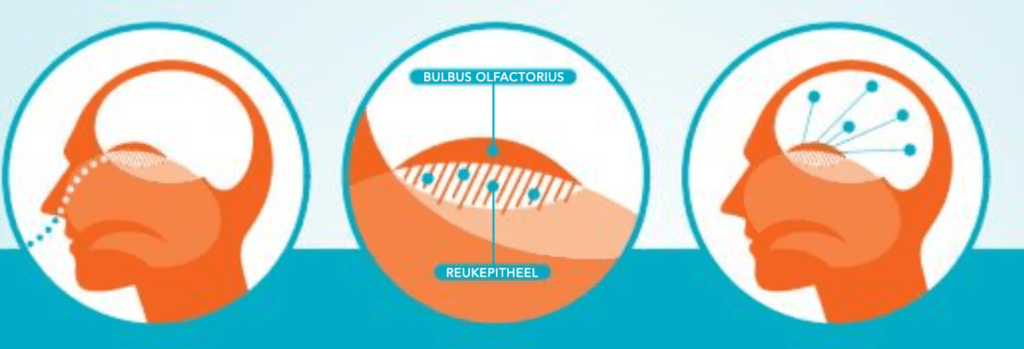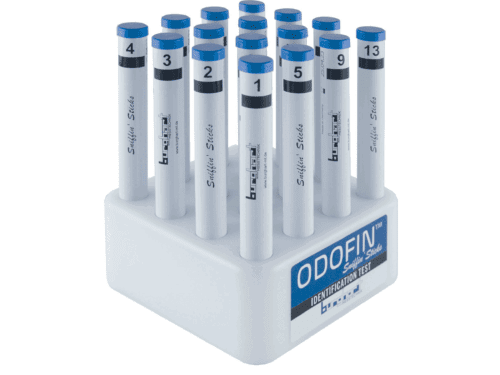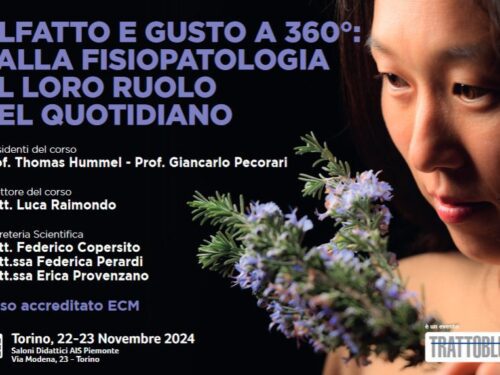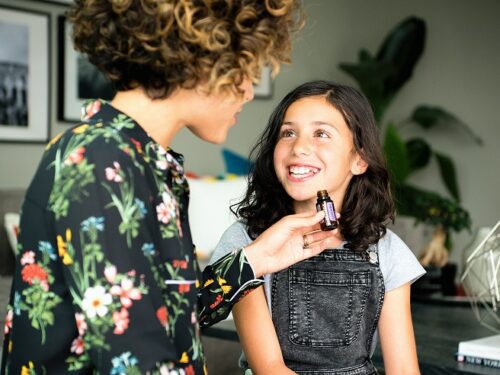Have you or someone close to you recently suffered from a reduced sense of smell? Then it may well be that you have an olfactory disorder and that you suffer from, for example, parosmia or phantosmia. Both are disturbances of the sense of smell and in this blog we will briefly explain what they are, how they arise and how you can deal with them in the future.
What is parosmia?
Parosmia is the name for a disturbance of the sense of smell. You do perceive odors, but they are processed in a different way than normal. This way, scents that you normally don’t like can suddenly smell nice and vice versa. There are two different types of parosmia, namely:
- Euosmia: existing odors are perceived as pleasant odors.
- Troposmia: existing odors are perceived as bad or unpleasant odors. These are often burnt or rotten smells.
How does Parosmia occur?
The mechanism by which Parosmia can occur is not fully understood, but they are thought to result from damage to the olfactory receptor neurons, the cells in our nasal cavity that detect odor molecules. It is entirely possible that damage to other parts of the olfactory system, such as the olfactory bulbs, can also cause these conditions. Parosmia can be caused by a head injury or by an upper respiratory infection (e.g. COVID-19). It is also common in people who have completely lost their sense of smell (known as Anosmia), in which case Parosmia is the recovering phase in which odors cannot yet be properly placed in the brain.

What is Fantosmia?
Phantomsmia is the name for having smell hallucinations, or perceiving (phantom) smells that are not there in reality. This can be a constant observation but also an observation that occurs occasionally. The unpredictability of the condition makes it difficult to determine what is actually going on with the body. This disorder can be present every day or absent for very long periods. When you keep smelling a bad or unpleasant odor that is not actually there, this is called cacosmia.
Smelling odors that are not there, how is that possible?
When smelling odors that are not there, phantosmia occurs, this is an olfactory hallucination. This smell disorder can be caused by, for example, a head injury or by a viral infection such as a severe flu or infection with the COVID-19 virus. The brain does not receive the stimuli from the olfactory nerve properly, there is noise on the line and you may therefore experience an incorrect olfactory experience.
What happens in the brain with Parosmia or Fantosmia?
During normal odor perception, odor molecules are captured in the nasal cavity, through which they enter the body. The nasal cavity contains the olfactory epithelium, where the olfactory receptors are located. Odor molecules in the air are absorbed by the mucous membrane, the molecules dissolve in the mucous membrane and transmit stimuli to the olfactory nerves. The nerves transmit the stimuli to the brain where every perception is properly placed. Something goes wrong somewhere in the process of Parosmie and Fantosmie.
Foul odor in nose
If you have a bad odor in your nose or smell a strange odor, it may be cacosmia (a form of phantosmia) where you smell bad or strange odors that are not present in reality. In this case there is an odor hallucination. It may also involve the troposmia disorder (a form of parosmia) in which odors are present but are perceived as foul or unpleasant odors. These are often burnt or rotten smells.
You can check which of the two disorders it is by asking people with a well-functioning sense of smell for help. Ask them if there is actually an odor present or if you detect odors that are not there at all. In this way you can determine whether there is cacosmia or troposmia.
Another possibility that can lead to a bad odor in the nose is the disease Atrophic rhinitis. This is not an olfactory disorder but a chronic condition of the nasal cavities. In Atrophic rhinitis, the mucous membrane of the nose becomes thinner and dries out, and in some cases the underlying cartilage and bone will also be affected. The dehydration will lead to bleeding in the nose and crusts will form, which can lead to an unpleasant odor. As soon as this odor occurs, it is often an advanced condition; eventually the sensory cells will die, causing the sense of smell to be lost. Do you feel that this is the case with you? Please contact your GP as soon as possible for further examination.
Nasal plug for parosmia?
We are occasionally asked whether it is also useful to use nasal plugs in the case of parosmia. Nose plugs can be a temporary solution for masking and blocking odors, including bad odors. The NOSA methol nose plug that we supply has a fresh menthol scent. You can wear the plug for 8 hours and the scent will be active. In addition, the nose plug is discreet and therefore not noticeable. They are also made in such a way that they fit comfortably and do not block breathing. In this way, nasal plugs may help with parosmia and reduce the perception of unpleasant odors. In this way it can be a tool to ease daily life with parosmia.
We always recommend contacting your GP or ENT specialist for expert advice.
What other olfactory disorders are there?
Naast de stoornissen parosmie en fantosmie zijn er de volgende reukstoornissen:
- Anosmia: The total loss of the sense of smell. A distinction can be made between selective and complete anosmia. As the name suggests, selective anosmia is the inability to smell certain odors. In complete anosmia, the person will no longer be able to perceive any smell.
- Hyposmia: a decreased sense of smell. This is a quantitative olfactory disorder and comes in varying degrees: mild, moderate and severe. This form of sense of smell loss is common with aging and is not reversible.
- Hyperosmia: This occurs when a person perceives odors excessively. The odors are correctly perceived but at a higher intensity.
- Agnosmia: smells are perceived but the person is unable to name these smells.
Read more about olfactory disorders on the next page: smell disorders
Tips and Tricks to Improve Sense of Smell
There are a number of options to improve your sense of smell, the most commonly heard method is to start with smell training. This is easy to do at home by smelling 4 different scents twice a day. By regularly training your sense of smell, the connection between the brain and the sense of smell will recover more quickly and you increase the chance of restoring your sense of smell. You test your memory by performing the training more often, the brain will start to associate smells with certain situations and foods. More information about smell training can be found here: smell training







